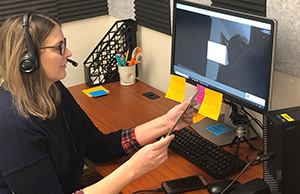Transforming the Landscape of Behavioral Health Access for Geographically Dispersed and Military-Connected Children and Families across the Midwest
Thursday, February 22, 2024
Accessing and navigating services for children with developmental, emotional, or behavioral health (D/E/B) concerns has greater complexity for military families, geographically-dispersed families, and families who are highly mobile or lack providers near their homes. University of Minnesota’s Masonic Institute for the Developing Brain (MIDB) has received $3.5 million to lower these barriers as a partner in the Department of Defense Child Collaboration Study “A Research Collaboratory to Explore Best Practices for Expanding Access to Care Through Expansion and Support of Telehealth Care for Children and Families with Behavioral Health Needs.”
Led by Jessica Simacek, PhD, who serves as principal investigator (PI) of this award, the MIDB TeleOutreach Hub —a collaboration with the University’s Institute on Community Integration—will develop the Minnesota Telehealth Innovation site for training; technical assistance; and evaluation with providers, educators, and families to improve access to services and overall outcomes for children and adolescents with D/E/B needs.
“Families wait far too long to access high quality care and support, particularly when they relocate often or live in geographically-dispersed areas,” says Simacek. “Telehealth and related flexible models of care and provider training hold promise for changing the care landscape in Minnesota. In this project, we are improving how we provide care to families and how we build provider capacity to meet the unique needs of these populations.”
Numerous activities have already begun, including Project ECHO collaborations with greater Minnesota providers to extend provider capacity; the development of digital tools ; and exploration of telehealth models to improve rapid access to early intervention for families with waitlisted children with autism and related developmental disabilities.
The efforts of the Minnesota Telehealth Innovation site will be supported by several additional MIDB Service Hubs , including Analytics, Community Engagement and Education, and Informatics. University-wide collaborators are the Center for Applied Research and Educational Improvement the College of Education and Human Development , Educational Technology Innovations , Health Sciences Technology, the Institute on Community Integration, and University of Minnesota Extension .
“This subaward embodies the MIDB mission to bring together a community of culturally mindful and competent experts to advance brain health from the earliest stages of development across childhood, youth, and the lifespan,” emphasizes Damien Fair, PhD, co-director of MIDB and co-PI of this award. “Importantly, it does so, not only for the communities that reside near MIDB, but children and families statewide.”
